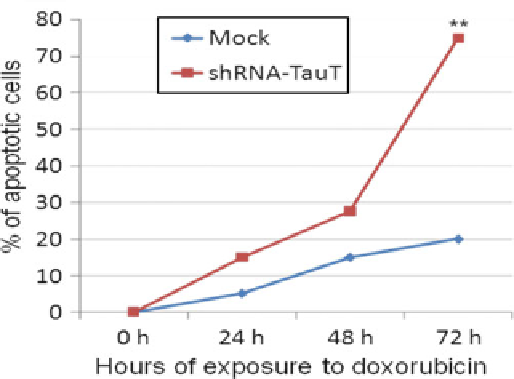Biology Reference
In-Depth Information
Fig. 28.4
Cell viability was counted at 24, 48, and 72 h in both cell lines. The data represent three
separate experiments. The results demonstrate that a significantly greater percentage (nearly 75%)
of the shRNA-TauT cell culture underwent apoptosis after a 72-h period, compared to a mere 20%
in the mock cell culture. Results demonstrate that
TauT
inhibition significantly increases the sensi-
tivity of 293 cells to doxorubicin
28.4
Discussion
It is known that the taurine transporter gene is primarily regulated by dietary taurine
availability and changes in osmolarity in the kidney (Chesney et al.
1985
; Handler
and Kwon
1997
). Molecular cloning of the promoter of the
TauT
gene has advanced
the knowledge of such regulation at the molecular level and has allowed us to
explore the possible biological functions of
TauT
in both physiological and clinical
settings. Recent studies have shown that
TauT
is directly regulated by a variety of
transcription factors, such as the p53 tumor suppressor gene, WT1, c-Jun, c-Myc,
c-Myb, and estrogen, suggesting that
TauT
may play a role in cell development,
drug resistance, and even tumor biology (18).
In the present study, we created a TauT-deficient cell model by RNAi in human
embryonic kidney 293 cells, and the effect of
TauT
on renal development was inves-
tigated. Knockdown of
TauT
significantly decreased the growth rate, cell migration,
wound healing, and colony formation of 293 cells. Inhibition of
TauT
causes cell
cycle G2 arrest and sensitizes 293 renal cells to cisplatin-induced apoptosis.
Microarray analysis shows that
TauT
deficiency results in the elevation of several
tumor suppressor genes, including p53, FAT, and Split-2. Inhibition of
TauT
down-
regulates many solute carrier family genes, including the sodium/hydrogen
exchanger, zinc transporters, proton/amino acid symporter, glycerol-3-phosphate
transporter, neutral amino acid transporter, anion/sugar transporter, and glucose
transporter 3 (GLUT3). Downregulation of solute carrier family genes may be asso-
ciated with cell cycle G2 arrest in TauT-deficient cells, as these genes are mainly

Search WWH ::

Custom Search